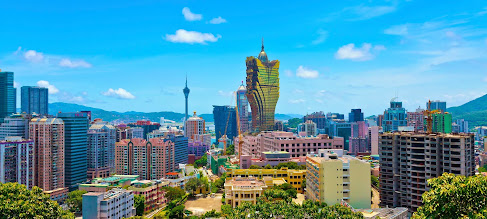When the Portuguese arrived in Macau to propagate Christianity, the first priests began building Catholic churches right once. The early churches were built of wood and matting. By the mid-eighteenth century, these constructions had been built with plaster and stone.
Apart from the famed St Paul's Ruins, several churches, squares, and religious buildings built by the Portuguese are still surviving across the city and are part of the UNESCO Macau World Heritage Sites. Pack your bags for vacation and you can check how to book Tap air flight Ticket from the official site.
A-Ma (Mazu) Temple
Before the city of
Macau was founded, there was A-Ma Temple. The Gate Pavilion, Memorial Arch,
Prayer Hall, Hall of Benevolence, Hall of Guanyin, and Zhengjiao Chanlin are
all part of it. This shrine, which dates from the 15th century, is dedicated to
the mariners' goddess. A poor girl named A-Ma wished to go to Canton but was
turned down by affluent trash owners, according to tradition. A humble
fisherman gave her a ride on his boat. Except for the little boat carrying the
sad girl, everything at sea was destroyed by a massive storm. When they landed
in Macau, the girl was nowhere to be found, but she reappeared as a deity.
A Venetian Themed
Hotel
The Venetian, a
Vegas-style and Venice-themed hotel, is one of the most elegant and greatest
places to visit in Macau. It is noted for its ultra-luxurious surroundings,
excellent décor, opulent amenities, and exciting activities.
Gondola Enjoy deluxe
cabanas for a lavish poolside experience and shop at the Manchester United
Flagship store as you ride around the resort canals beneath a painted sky
ceiling. Prepare to bet in the largest casino in the world.
Moorish Barracks
The Italian architect
Cassuto created this Moorish-inspired structure in 1871 to house roughly 200
Indian officers from Goa who were deployed to Macau by the Portuguese. It was
constructed in 1874. The Maritime Authorities of Macau now use the structure.
St Joseph's Seminary
and Church
This gorgeous church,
which was built in 1728 as part of the Jesuit school of St. Joseph, was opened
in 1758 and is a popular subject for artists. Together with St Paul's College.
The Seminary served as the primary basis for missionary work in the Chinese and
Japanese territories.
The Portuguese Queen
Dona Maria I bestowed the royal title of "House of the Mission
Congregation" on it in 1800. The structure of the church is
cruciform, with high domed ceilings. Outside the church are an antique well and
a plant plantation.
Dom Pedro Theatre
The Dom Pedro
Theater, named after King Pedro V of Portugal, was constructed in 1860.
Pedro Marques created
this pastel green building in 1858, which comprised an auditorium, a bar, a
café, and a pool room.
With a seating
capacity of 350, it is regarded to be one of Asia's oldest western-style
theatres.

